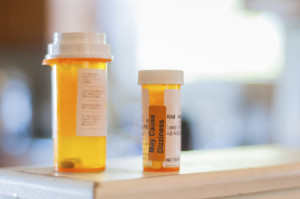
Say you suffer from acid reflux and your doctor prescribes an antacid like Nexium or Prilosec. Because your condition is chronic and the medicine helps you feel better, you keep taking it.
After a year, your doctor orders a blood test and finds that your magnesium level is low. She tells you the antacid may be to blame and starts you on a magnesium supplement or changes your medication.
What’s going on here?
Some antacid medications can interfere with the body’s ability to absorb nutrients over time. When the nutrient that’s being lost is magnesium, you could be at risk for weakness or seizures.
“Although these meds can be used long term for certain conditions, they’re technically designed to be used for the short term,” said Tiffany Town, PharmD, a clinical pharmacy specialist who works on-site with patients at two Spectrum Health Medical Group primary care offices. “And though it’s rare for an antacid to cause nutrient depletion, it does happen—usually after a patient has been on the med for over a year.”
Antacids are just one class of medications that can rob the body of vitamins and minerals, said Dr. Town. Among the many drugs that can do this, the four groups of medications listed below are seen most often in primary care.
Common drugs that may deplete nutrients
1. Antacids that work as proton pump inhibitors
These drugs, which include Prilosec and Nexium, “get into your stomach and shut off the acid-producing pumps for about 24 hours,” Dr. Town said. If taken longer than a year or two, these medications can lower a patient’s levels of three nutrients: magnesium, calcium and vitamin B-12. These side effects are more prevalent in females and patients younger than 30.
Because these drugs are available over the counter, Dr. Town said, “we don’t always have the physician oversight that we otherwise would.” So if you’ve decided to take Prilosec or Nexium, follow the package instructions.
“People read on the package, ‘If you take this for more than two weeks, consult your doctor,’ but I don’t think they know why,” Dr. Town said. “They think, ‘Well, it’s over the counter, it’s safe.’ Just because it’s over the counter doesn’t mean that it’s safe for the general population, long term. There’s a reason that they put the warnings on there, and it’s best to ask the doctor or pharmacist, ‘Why does it say that?’”
2. Antacids that work as H2 receptor antagonists
These meds, including Pepcid and Zantac, use a different mechanism to block acid production in the stomach. Some patients respond better to this type of antacid than the other, Dr. Town said. With prolonged treatment, patients—especially women and younger people—should be monitored for a vitamin B-12 deficiency.
If you’re taking Zantac or Pepcid on a long-term basis, check with your doctor.
3. A diabetes medication called Metformin
“This is one of our first-line diabetes medications, so if you have type 2 diabetes, chances are you have been on, or are on, Metformin,” Dr. Town said.
For a small percentage of patients—especially those with an inadequate dietary intake of vitamin B-12—this drug can decrease stores of vitamin B-12 in the body.
“I think of vegetarians and vegans, because B-12 comes from a lot of the red meats,” Dr. Town said.
The good news is that the problem is quickly solved with the addition of a vitamin B-12 supplement. A doctor’s rule of thumb, said Dr. Town, is to test Metformin users once a year for levels of vitamin B-12, as well as folic acid.
4. Blood pressure medications in the thiazide diuretics category
Patients who take these pills, which include chlorthalidone or hydrochlorothiazide, may find themselves with decreased levels of potassium and magnesium. Because of the way these drugs work in the kidneys, nutrients are lost through urination rather than retained in the blood, Dr. Town explained.
Doctors typically monitor patients’ electrolytes a week or two after they start on this type of medication—and at least yearly after that “to keep an eye on things, especially the potassium level,” Dr. Town said. “Low potassium can lead to heart palpitations and muscle twitches.”
Patients can sidestep these risks through diet and supplements, said Krista Gast, a registered dietician nutritionist with Spectrum Health.
“If your medication makes your potassium too low, that’s something that you need to stay on top of,” she said. “You can certainly supplement that with potassium-rich foods like bananas, potatoes and leafy green vegetables, but that may not be enough. Some patients will have to take potassium supplement pills, so follow-up is important to make sure you’re getting that checked.”
Drugs that can have the opposite effect
Because the body is complex, some drugs can work the opposite way: Rather than depleting our nutrient levels, some medications can boost them to unhealthy levels.
In her work with primary care patients, Dr. Town encounters two main types of drugs in this category, both of them blood pressure medications: ACE inhibitors, such as Lisinopril, and ARBs, such as Losartan.
These drugs can increase potassium in the bloodstream to dangerous levels, and doctors watch out for this.
Fortunately, these meds and the potassium-depleting diuretics can work together to “cancel out each other’s effect,” Dr. Town said. “It’s just kind of a happy coincidence because they both work differently, mechanistically, for blood pressure control, and it’s very common to need more than one agent.”
What can patients do to avoid these risks?
Both Gast and Dr. Town stress the importance of learning about the medications you’re taking. Here are 6 rules of thumb:
- If you’re taking one of the medications described above, whether prescription or over the counter, let your doctor know.
- If you have questions about any of the drugs you’re taking, ask your doctor or pharmacist. “We’re there to answer those questions,” Dr. Town said. “We don’t want you to be afraid; we want you to be informed.”
- Make sure you understand why you’re taking a medication. “Asking what it’s for and why I’m putting it in my mouth is the biggest thing,” Dr. Town said.
- Ask whether your medications require monitoring or have side effects you should watch for.
- Read the package insert. “When you get prescription drugs, the most important thing you can do is read the information that comes with it,” Gast said. “Most people pitch it without reading it, but educating yourself about your medications is really important.” For example, Gast noted that certain antibiotics can interact with dairy products to decrease the drug’s effectiveness; interactions like these are listed in the insert.
- If you have questions about how to maintain a good balance of foods in your diet, ask to meet with a dietitian. This consultation may be covered by insurance.
A note about supplements
Dietary supplements are not regulated by the U.S. Food and Drug Administration, so it’s hard to be sure of their quality.
If your doctor wants you to take a vitamin or mineral supplement, how do you know which products to trust?
Dr. Town recommends looking for the USP verified mark on the bottle. This mark confirms that the supplement was manufactured according to strict standards. Two brands that have gone through the USP testing process are Nature Made and Kirkland.
 /a>
/a>
 /a>
/a>
 /a>
/a>
This was a great article, and very informative, thanks for providing!
Thanks Barb! I found it interesting as well and was glad we could write about it to help others. 🙂
I liked the articles, very informative, thank you
You’re welcome, Robert. Welcome to Health Beat! If you haven’t already, make sure to bookmark our Health Beat website on your computer or phone and visit us often as we update several times a day. You won’t want to miss a single story. 🙂
Very informative, thanks for providing!